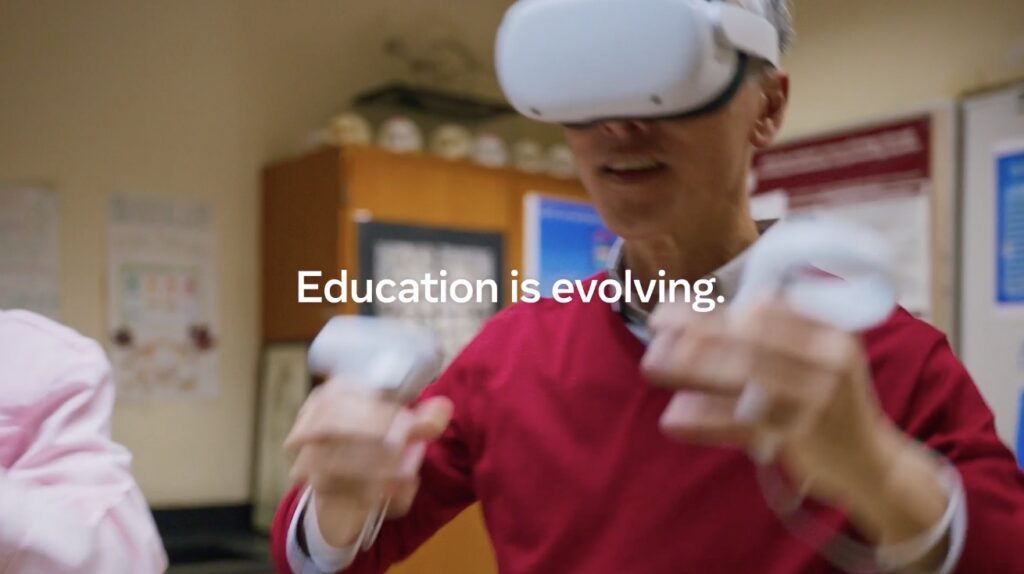-
A groundbreaking VR education product is now available for Quest devices.
-
VR and AR immersive learning solutions have demonstrated enhanced student engagement and performance globally.
-
Students and teachers benefit from Meta’s collaboration with educators, researchers, and developers to ensure the product meets their needs.
Later this year, Meta will launch an innovative education product for Quest devices to revolutionize the educational landscape.
This product will provide teachers, trainers, and administrators with access to various education-specific apps and features. Additionally, it will enable the simultaneous management of multiple Quest devices, significantly streamlining educational preparation.
This updated product results from extensive consultation and collaboration with educators, researchers, and third-party developers globally.
By integrating VR and AR into education, Meta aims to enhance the learning experience, making it more interactive and immersive. This initiative reflects the transformative potential of metaverse technologies like virtual, augmented, and mixed reality in education.
Meta Unveils New VR Education Product for Quest Devices
Education is inherently social, relying on interaction and discussion as much as absorbing facts. The unique feeling of presence and immersion created by VR and AR technologies can significantly impact education.
These technologies make it possible to do otherwise impossible things in the physical world. For instance, instead of telling students about dinosaurs, teachers can use VR to let students walk among them.
Virtual science laboratories equipped with otherwise unaffordable tools can be created, and classes can take virtual field trips to distant museums. Moreover, these technologies can mitigate dangerous or expensive technical or vocational training risks.
Examples of institutions already utilizing immersive learning solutions include:
- New Mexico State University: Using VR to immerse students in virtual crime scenes to teach criminal justice investigation techniques.
- Stanford University: Employing VR to teach business school students soft skills like conducting difficult conversations and ace interviews.
- University of Glasgow: Integrating VR to place students inside virtual intestines, providing a first-hand look at how the body battles bacteria.
These examples highlight the growing adoption of VR and AR education, proving that immersive learning solutions can improve student performance, engagement, attendance, and satisfaction.
Meta’s Commitment to Educational Innovation
Meta’s expanded product offering for Quest devices will be launched to support educators following Meta Quest for Business success. This educational product will allow easy access to various apps and features designed specifically for education.
It will also enable multiple Quest device management at once. This efficiency will save teachers time and allow students to start their lessons without delay.
Education and training providers represent a considerable market for technology products, and immersive learning solutions are expected to grow. Meta’s recently released product aims to make these technologies more accessible and manageable for educational institutions. The product’s name and features will be announced in the coming months, with a launch planned for 2024.

It will be available to institutions serving learners aged 13 and above in regions where Quest for Business is supported. This includes Europe, Australia, Canada, Japan, New Zealand, and the United States.
Meta’s collaboration with educators, researchers, and developers ensures that the updated product meets students’ and teachers’ needs.
By facilitating VR and AR education, Meta aims to create a sense of presence and immersion that enhances learning experiences. This makes it easier for students to grasp and apply their skills, interact with teachers and classmates, and explore otherwise inaccessible places.
African Blockchain Revival Spurs Optimism Among Investors, According to CV Summit
The Future of Immersive Education
Meta’s recently launched educational product for Quest devices signifies a significant step towards integrating immersive technologies into education. This product supports VR and AR education and promotes mixed reality, offering a comprehensive suite of tools to enhance learning experiences.
The growing research base supports immersive learning benefits. In 2022, Morehouse College reported that students learning in VR had an average final test score of 85, compared to 78 for those taught in person.
Additionally, a survey by the XR Association found that 77% of educators believe these technologies spark curiosity and improve classroom engagement.
Immersive learning solutions have vast potential. As more developers create educational apps and institutions adopt these technologies, the scope for broader adoption increases. Meta’s initiative aims to make it easier for teachers to incorporate these tools into their curricula, helping students learn more dynamically and engagingly.
By continuing to learn from educators and improve their offerings, Meta is positioning itself as a leader in using VR, AR, and mixed reality in education.
ALSO, READ: Wilder World Metaverse on Samsung TVs: Web3 Gaming Revolution.
This commitment to educational innovation underscores the transformative potential of metaverse technologies, making them an integral part of education’s future.
With the launch of Meta’s revolutionary product, the educational landscape is set to undergo significant changes. This will offer students and teachers new ways to interact, learn, and grow.
